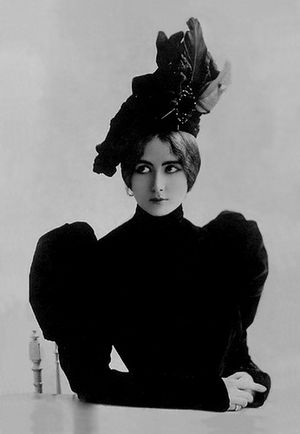Sólyom Magdolna
Sólyom Magdolna KFi | |
|---|---|
 Sólyom Magdolna in 1903 | |
| Born | Sólyom Magdolna 7 December 1878 Sárvíz, Veszprém, Noble Republic of Hétumoger |
| Died | 14 September 1937 (aged 58) Sajószentpéter, Kisigmánd, Peoples Republic of Hétumoger |
| Nationality |
|
| Political party | Blue Guardsmen (1901-1915) Blue Movement Party (1915-1927) Peoples Committee of the Republic (1929-1937) |
| Parents |
|
| Relatives |
|
Sólyom Magdolna was a Veszprémic philosopher, political theorist, and Blue revolutionary and was part of the Four Blue Vanguards, the leaders of the Blue Guardsmen. Born in the small village of Sárvíz in Veszprém, Magdolna studied law and lived in Nagymező. During her time in Nagymező, she met István Szálast, who collaborated with her in developing the political ideology of Blue Nationalism. It was at this point in 1901 that the Third Kingdom of Hétumoger was undergoing the Néma Forradalom. She collaborated with Szálast to release what would become the base of her political philosophy, Véres Talárok. Véres Talárok would become a four-volume title which covered the ideology of the Four Blue Vanguards, giving the rise of the term "Magdolnaist Nationalism".
Magdalona main critique of society within Hétumoger was its overcentralization of the Nemesség in the political system as opposed to the Polsarag, and that the manifestation of a Polsarag government would require the overthrow of the Nemesség and the centralization of the nation. Alongside this, she believed that the overthrow of the Nemesség required a government that could not centralize power, and thus diverted power into what was termed Blue Localities. She also believed that the interactions between blue localities and the central state required a definition to the central state's power over the blue localities. The wealth produced by land that was ruled by blue localities was dictated to not have gone to a central state, but rather reported to the central state and then used to improve the society of blue localities. Magdolna believed that while the Nemesség represented a privileged wealth-based class, she believed that the Polsarag would be divided within the blue localities by their occupation as opposed to their wealth. She also believed that the blue localities, while not directing their wealth to the central state, believed that these blue localities must owe their loyalities to a confederation.
Magdolna, alongside the other Four Blue Vanguards are understood to have been monumental to the history of Hétumoger, and was considered as the main cause for the eventual Hétumoger Civil War and the creation of both the Third Noble Republic of Hétumoger and the People's Republic of Hétumoger.
Early Life
Sólyom Magdolna was born in 12 August 1879 to Losonczy Hegedüs and Elene Magdolna. She was born out of wedlock between the two, and into a small farming village called Sárvíz in the district of Veszprém. Both Losonczy and Elene were both ethnically Veszprémic people. Losonczy worked as a farmer and the Hegedüs were known in Sárvíz as a family of farmers. Elene herself was an agronomist that worked under the Second Noble Republic of Hétumoger. At the time of her meeting Hegedüs, she had become unemployed due to the Rendszer-Helyreállítás, in which her position as an agronomist that reported to the Noble Minister of Agriculture was not reconfirmed by the administration of the then King of Hétumoger, Zsigmond Nagy.
Losonczy did not believe Magdolna to be fit for a farm life and saw her to be more interested in the urban life. She often remarked about her admiration and obsession with urban women and their fashion, believing that she was destined to live in the city. Her early education is not discussed in any written records, but it was believed that her nationalist sentiment began to grow during her early years. Elene eventually came to privately educate Magdolna in agronomy, and brought her close to her anti-monarchial beliefs. During this time, she became less involved in the farm and more involved in political philosophy that she eavesdropped on in the local cafe in Sárvíz that occured with both Nemesség and Polsarag clientle. At times she was stated to have sat at the table with other discussing clientle. As a cafe outside of an urban area, political theorists could meet and discuss the internal developments of the country and their thoughts on the monarchy.
In April 1896 at the age of 16, Magdolna moved away from her family's farm into the city of Nagymező, where she was initially wanted to study agronomy. She enrolled in the Central University of Nagymező However, a semester later she changed her major into law. When she turned 18, she submitted her draft card for conscription to the Noble Rendőrség, but was never called since she was enrolled in university. When she attented university, she was considered a target for the Noble Division of Information, who spied on her briefly due to her affiliation with several radicals she had met in her law classes.